- Home
- Shirley McKay
1588 A Calendar of Crime Page 3
1588 A Calendar of Crime Read online
Page 3
‘Aye, but he stinks.’ There was such a fit of childishness beneath his stubborn pride, despite his pompous posturing, that Hew was moved to smile. He felt, inexplicably, a fondness for Roger, who was not as worldly as he liked to think.
‘Of course he will stink. He is a candlemaker’s boy. But I have seen you carve your way through gobbets of green flesh, and hold your knife and nerve. Surely, as a surgeon’s page, you have not grown fastidious.’
‘Mebbe,’ Roger scowled, ‘I like my foul flesh dead. Well then, for Sam Sturrock’s sake I’ll take him for a drink. Since we are puir bairns both, we’ll charge the drinks to you.’
‘What are you about, Hew?’ Giles asked his friend, when the two of them were left together in the room, with no matter still between them but the candlemaker’s corpse.
‘Roger asked me to investigate the candlemaker’s death. He cannot comprehend that his master is at fault.’
‘He will, quite naturally, not want to comprehend it, in view of its consequence, not least for himself.’
‘Doubtless,’ Hew agreed. ‘You do not think, at all, there may be some hope in it?’
Giles was quiet for a moment. Then he shook his head. ‘Do you mean for Sam? I wish I thought there was. I like Sam Sturrock well. I have always believed him an honest, a credible surgeon. It grieves me in my heart to find him brought so low. And yet, I cannot help but find he is at fault, and gravely so. His conduct has led, quite directly, to this poor man’s death, through negligence, or worse. You saw his demeanour: he is quite aware of it. He offers no defence, for there is none to give. For every kind of fool that ever read an almanack can tell you, clear as day, there never was a time of month less apt for letting blood, nor season less auspicious for it, than the present one.’
‘As any fool might say,’ said Hew. ‘But men of physic make exception, surely, for a special case.’
Giles favoured his old friend with a narrow look. Presently, he said, ‘Men of physic do. And if you have the will to browse among my books, you will find recorded there whatever such exceptions may be safely made. I do not have the time just now to go through them with you, for I must tell a guid wife she is now a widow. I will see you at the college when that heavy work is done.’
In Giles Locke’s turret tower, Hew had spent the best hours of the afternoon reading on phlebotomy. ‘Let not blood at any time,’ the book began oppressively, ‘unless there is great cause.’ Hew wrote in a column all the arguments against: the weather, the season, the phases of the moon. In addition to the warnings set out in the almanacks – the present moon in Leo was especially inauspicious – there were impediments most pressing to the candlemaker’s case: the foulness of the air, the nature of his work, the severity of pain of which he had complained, the wobble in his wam, with vomiting and flux, his agitated state, his want of rest and sleep, his corpulence and indolence, the diet he had kept. In the column ‘for,’ he could write but one, and that he did not find in any kind of book. It was the surgeon’s own and only explanation: ‘Because he asked me to.’ And it was clear to Hew that made no kind of sense.
He was sitting hopelessly, chewing at his pen, when he was distracted by Johannes at the door. ‘Salve, Master Hew. I was told by the porter that you might be here. I have no wish to disturb you.’
‘Don’t then,’ muttered Hew. He had not intended that it should be heard; he spoke it in the Scots, but Johannes was a student of extraordinary faculties. He looked a little hurt, but not at all deterred. ‘What I have to say will not detain you long. You have been so good, to help me with my work. If you can say a time, that is most convenient to you, I would like to thank you, and return your books.’
‘Johannes,’ Hew said wearily, ‘there is no need to thank me. Please, keep the books. They may profit further study.’
‘As to that,’ Johannes said, ‘I have made some notes.’
Hew stood up, exasperated. He took from the shelf the first book to hand. ‘Here is a book that you have not yet read. It will profit you well to turn it into Latin’ – he glanced upon it quickly – ‘ah, to turn it from the Latin, into native Scots. That I think is somewhere where you lack experience.’
Johannes said, baffled, ‘It is a book about bees.’
‘And bees are, indeed, a very fine exemplar. You may come and see me, when the work is done.’
Had Hew been left for longer to his own devices, he might well have repented of this treatment of Johannes. But barely had he turned back to the case in hand, when Doctor Locke returned, with Roger at his heels, and both of them brought news that chased it from his mind.
II
It was chance alone that brought the two together; they had met on the turret stair, where Giles overcame his antipathy to Roger, sufficient to allow him access up to Hew. Roger spoke first. ‘You were right enough about the prentice boy. He had a tale to tell. His master, it seems, was a hard man to work for. He was little liked. There were many people might have wished him harm.’
‘It matters not,’ Giles pointed out, ‘how many may have wished him harm. One man harmed him. That was Sam. And if you mean to say he had a reason for it, that hardly helps his case.’
Roger said, ‘Hear me, for there is more. The boy’s last commission on the eve of Candlemas was to deliver candles to a guid wife out of town. That woman was by no means well disposed towards his master. The boy believes she put a curse on him. He is quite convinced, that she is a witch. He saw a spirit in her house. Perhaps it was that wife that killed the candlemaker, caused his vein to burst by the casting of a charm.’
Giles retorted, ‘Pah!’ an expression of disgust which he did not clarify, by gracing it with words. But Hew, more circumspect, inquired of Roger if he knew the woman’s name.
‘She is, I understand, some relation to the Balfour family. She is aged, far beyond the common course of life, and she lives in a coven, by the Poffle of Strathkinness, two or three miles from the town.’
Giles corrected, with a snort, ‘She is a distant cousin of the Balfours. She has lived in seclusion now for many years, in a house she rents from them. Her given name is Ann. She is a lady, though a very poor one. And she is by no means a witch.’
‘Do you know her?’ asked Hew.
‘She is a patient of mine. And if you will libel her, with this vile lie, I will take it much amiss.’
‘Who says,’ Roger countered, ‘that it is a lie?’
The doctor turned on him. ‘There speaks the boy, who has no faith in God! You do not for a moment take her for a witch, for you do not believe in them. And yet you will not hesitate to propagate the slander, for the sake of Sam. It is not just, nor honest. It is vicious, cruel and foul.’
Roger coloured at his words, but would not be cowed. ‘Is it, though? Are you so very sure, that it cannot be witchcraft? When will you admit, that there is something in this case your physic and your science cannot yet explain, and recognize the evidence right before your eyes? Do not pretend you did not see it too. I know you did.’
‘What evidence?’ asked Hew.
‘Aye, tell him,’ Roger urged.
‘Roger here believes he has the cunning of a surgeon, when he has been employed by one no more than seven months. That is not so strange. For when he was a student here, he knew himself to be so fully a philosopher, he did not need to trouble taking his degree,’ Giles remarked, evasively.
‘What evidence?’ said Hew, again, until his friend replied. ‘As I understand, he is referring to the fact that the incision seems too deep. The vein was severed through. It is Roger’s contention, that if his master’s blade had buried in so far, the wound could not be stopped, and John Blair would have died of it, statim, there and then.’
‘And is there any truth to it?’ It was rare enough that Giles was unequivocal, and it was clear to Hew that he was not so now. His antipathy to Roger made manifest, perhaps, his own internal doubt.
Giles answered honestly. ‘It is, to be sure, an exaggeration. A man may cut hi
s arm off, and survive, with proper care. But, I will confess, it gave me some concern. I come to the conclusion, that John Blair’s exertions on the night he died caused the vein to tear, severing completely the place that had been cut. Roger is correct that it does not satisfy, and yet it seems to me the only explanation. The fatal error was in bloodletting at all.’
‘It is not an explanation,’ Roger argued, ‘that has any credence, more than witchcraft does. You will not deny, whatever else you think of me, that I am an expert in using knives on flesh, from long years of experiment.’
‘That is true enough.’ Hew supported him.
‘Therefore, I ken its properties. Am I not to judge, how the thing was done? And I would chance my life, my master had no hand in that savage piece of butchery. That was not his work.’
‘The pity then,’ said Giles, and the sadness in his voice revealed no relish for the argument, ‘is that he says it was.’ And Roger had no answer to this final word.
‘Well,’ reflected Hew, ‘whatever is the cause, I think that I must talk to Ann Balfour. For if the boy accused her for a witch, then it must be proved, or the rumour quelled, before it can take hold. I will call on her tomorrow.’
Giles consented, ‘Aye, it grieves me that you must. Be conscious of her age, and gentle with her, Hew. Meanwhile, you should go to see the candlemaker’s wife. The body has been taken to their house, which is on the North Street very close to here. She is most indignant at her husband’s death, for which she holds the surgeon firmly to account. I telt her we were looking into it most properly, and you would likely come by to investigate. Which seemed to ease her mind.’
‘Then I shall go now, before I leave for home.’
‘Will you not come, first, to talk to Sam?’ Roger begged. ‘Allow him the chance, the better to explain himself. Or else you will have her damn a man unheard.’
‘Tsk,’ objected Giles. ‘We will not have that.’
But Hew responded coldly; he needed to be certain Roger understood. ‘I will talk to him. But you should be aware, whatever happens next is likely to have consequence. There is no turning back, if you do not like the truth. I cannot promise things will turn out well for Sam. They may well be worse.’
The surgeon’s house was situated in the Market Street, conveniently close to the apothecary. A small consulting chamber opened to the street, scarcely out of place among the other shops, where the nature of its business was exposed to public scrutiny, and passers-by could judge the surgeon by his wares. Here, a man might watch the pulling out of teeth, and in the balmy shadows of an afternoon in spring, when the wind was warm and the weather temperate, a crowd would form outside, spilling down the street, for the pleasures of phlebotomy. On fair days, it surpassed all other entertainments.
It was in this chamber Roger had left Hew, while he went inside to fetch the barber-surgeon. The house behind was small, a single room in width. Roger slept above, in a narrow loft, a modest home enough for a man to lose, when all his future hopes had been invested there. The chamber now was dark, the shutters closed defensively against the craning street. Roger had left Hew the light of a lantern, and its shadows lit upon the metal glow of instruments, stacked upon shelves and hanging from the wall. The box chair, disconcertingly, was bound with leather straps. It was not a place where Hew could find comfort, with or without the presence of the surgeon, and he jumped a little at the opening of the door. There he saw not Sam, but Isabel, his wife.
She was loosely, but modestly, dressed, in a grey kirtle and gown, and a little lace cap, to cover her hair. In the light of the lantern she looked very pale. Her voice, when she spoke, was serious and strained. ‘Roger says that you have come to help. How I wish you could. But my husband will not talk to you. It is hopeless, I fear.’
‘Come,’ he encouraged her, ‘nothing can be hopeless. What has he told you?’
‘That he is responsible for a poor man’s death, and fears that he may hang for it.’
Could it come to that? Hew believed it could. For surgeons had been hanged for recklessness before, where they endangered life. ‘He telt you he felt himself to blame for it? Did he tell you why?’
‘He will not say, at all. And reason cannot move him to confide.’
From above them came the cry, tremulous and shrill, of an infant child. Unconsciously, her hand was drawn towards her breast. ‘That is my bairn. I must go.’
‘You have a new-born child?’
‘She is ten days old. I should not have come, to show myself to you. I have not been kirked.’ The taint of her childbirth was fresh still upon her, she meant. She had not been cleansed. She smiled at him. ‘This day is Candlemas, the feast of the purification. I find that sad, and strange. But we do not count it now.’
It occurred to Hew that Roger had arranged for this. He did not reappear. But doubtless, he had hoped to provoke Hew into pity for the surgeon’s wife. If that was his intention, he had calculated well. For Hew could not dispute that the design had worked.
He told himself the candlemaker also had a wife, and reset the balance, calling on her next. She had rebounded from the horror of her husband’s death with a strange resilience. ‘I expect,’ she said, ‘that ye have come to see himself.’
He echoed her, ‘Himself?’
‘My husband, Jock,’ she returned complacently, ‘in the nether hall.’
‘I saw him at the shop.’ And that had been enough. He would not look again.
‘Aye, not like this. Come away and see. It will ease your mind.’ She took him by the hand, as though he were a child, and led him to a room at the back of the house, where the candlemaker lay, flat upon a board, with a strange, seraphic wonder staring from his face. His cheeks were soft and plump, coloured with red lead, and his hair was tinted yellow, neatly trimmed and combed. He was stripped of his clothes, but his nakedness was bound in acres of white cloth, sprinkled with fresh herbs.
He asked her, ‘Did you wash him yourself?’
‘Why would I not?’ There was fondness in her smile. ‘Would you have me leave him to a stranger?
‘No, by no means. But it must have been hard for you.’
‘Not hard at all. Look at him, now. Handsome is he not? He was a stubborn man, and not, some wid say, an awfy pliant one. But he bent, good as gold, quiet as a lamb. And never did I see a more bonny- looking corpse.’
Bonny though he was, Hew could not stomach Jock for long, and he edged her back into the other room. There she was boiling something greasy in a pot. It was all, she declared, Sam Sturrock’s fault. ‘He never should have opened up that vein.’
‘Did you advise your husband against it?’
‘Advise?’ She laughed at that. ‘There was no advising, wi’ Jock. He wasna one for advice. And he would not be turned, from where he set his mind. His headaches plagued him cruel, and he got it in his head that the cure was letting blood. I cannot tell you why. But it was the surgeon’s job to free him of the fallacy, if that is what it was. Wha should ken but he?’
‘Were you in the crackling house, on the day he died?’ he asked.
‘For a while, I was. Then he sent me hame, for to make the soap. We did not rub along, together in the shop. I do not like the stew. He said I did things wrong. I had a thought, to put a drop of perfume in the tallow, so to scent it sweet. Jock said it was daft.’
’Perhaps you could try it, now that he is gone?’
She was pleased with that. ‘Mebbe, then, I will. I am going now, to give a hand to Eck. He has orders to fill.’
‘But what of your husband?’ Hew wondered.
‘He will not gainsay it,’ she said.
Frances, sitting shadowed in the warm light of the fire, had a kind of glow to her, that served to reassure Hew of her spark and strength. And there was nothing in the least about her petted or indulged, for when he told her that he had not brought the candles, she cried out at once, he should not spare a thought to fret upon her foolishness, which made him wish he had them, all the sa
me. Instead, he brought her wine, and sweet white almond cakes, and settled by her side he told to her the story of the candlemaker, while she listened carefully, and did not turn her face from his until the tale was done. And he could not imagine a world where coming from the cold to sit before the fire he should not find her there, and share with her the weight of matter on his mind.
When he paused at last, she said, ‘A new-born infant, too. I cannot help but feel for them.’
It sobered him to hear her light at once on that. He had not, deliberately, skewed the tale to Sam. But then, he considered, it was natural enough, that the surgeon’s circumstances played upon her sympathy. Had they coloured his?
‘And tomorrow,’ she had smiled, ‘you must go to see the witch. I wish you would be careful, Hew. For I should not like it if she cast a charm on you.’
He rode west towards the Poffle at Strathkinness, until he came to a dilapidated farmhouse, nestled in a clearing in a copse of trees. Outside in the yard, a female of great age drew water from the well, while her ancient counterpart split firewood into logs, a test of strength and vigour for which both were ill equipped. The old man left his work as soon as Hew approached, but buckled at the knees, and could not straighten up. ‘Can I help you, sir?’
Hew asked if he might speak with the mistress of the house, on business that concerned her and the candlemaker. The woman was despatched to take the message in, while the old man offered stabling for his horse, which comfort was a fencepost, where the mare was tethered, in a thistle patch. Hew occupied his time in filling up the guid wife’s buckets from the well, to her man’s disgust. ‘You will mak her soft.’
The woman reappeared, to whisper an instruction in the old man’s ear. She gazed upon the buckets with a blank astonishment, fearful of the magic that had taken place. The old man shuffled off, and beckoned Hew to follow, entering the house. Hew found himself inside a dark-oak coloured hall, a single draughty chamber partitioned at one end to form a sleeping place. The furnishings were sombre, heavy and ornate, and held within their finery an odour of decay. In a pewter chandler, and in sockets round the wall, a score of tallow candles lit among the dust yellowed to obscurity the fleeting strains of daylight, spilling out a sweaty, faintly fetid smell. Beyond them clung the last notes of a heavy kind of perfume, darkly sweet and sinuous. He felt its tendrils quiver, fragile, in the air.

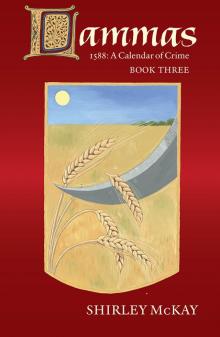 Lammas
Lammas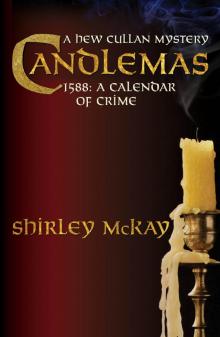 Candlemas
Candlemas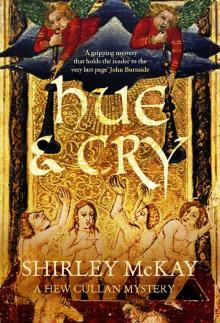 Hue and Cry
Hue and Cry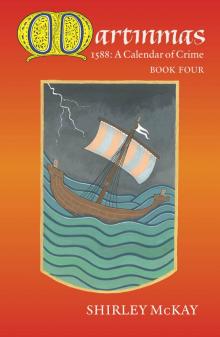 Martinmas
Martinmas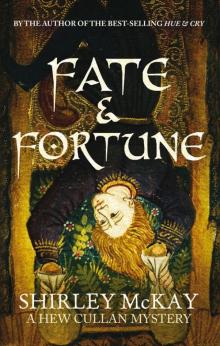 Fate and Fortune
Fate and Fortune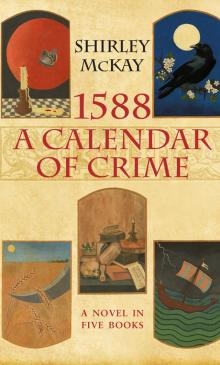 1588 A Calendar of Crime
1588 A Calendar of Crime Time and Tide
Time and Tide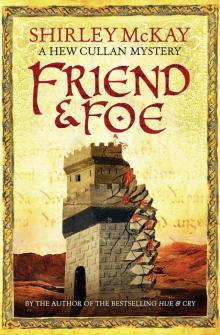 Friend & Foe
Friend & Foe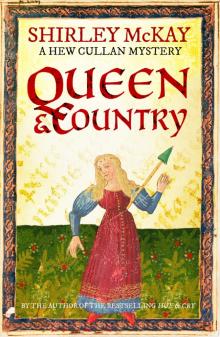 Queen & Country
Queen & Country